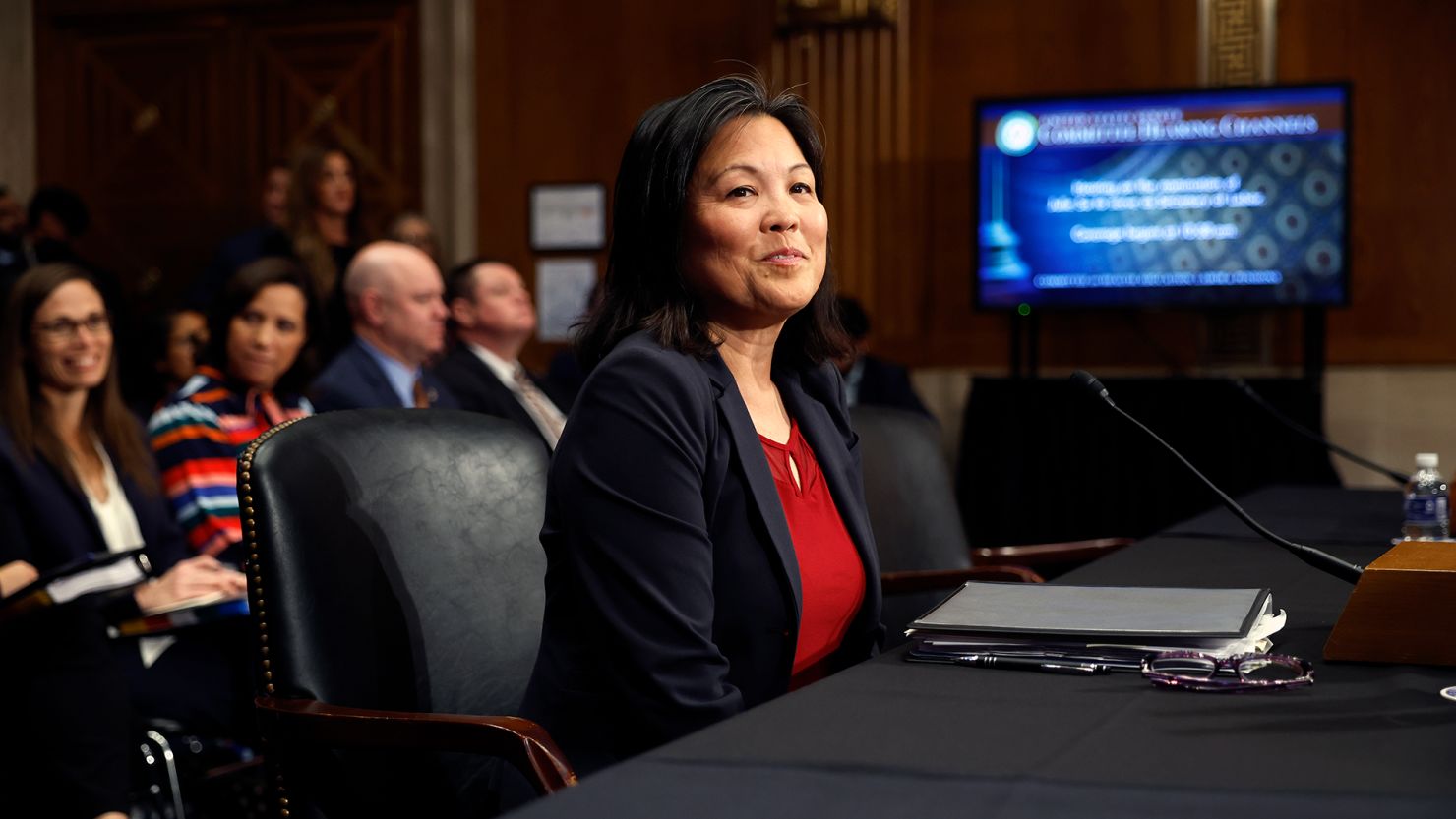Julie Su, the Biden administration’s labor secretary nominee, appeared before the Senate Health, Education, Labor and Pensions committee on Thursday, where she attempted to make the case for her confirmation as she was grilled by Republicans over her record.
The Democratic majority on the Senate Health, Education, Labor and Pensions Committee, which held Thursday’s hearing, appeared largely supportive of Su’s nomination. But she has not yet secured the support of other key Democrats in the Senate – suggesting she could face an uphill battle to confirmation when the full chamber casts its vote.
If confirmed, Su would be the Biden administration’s first ever Asian-American Cabinet secretary, leading the Department of Labor amid a time of broad economic concerns but low national unemployment. If Su does not convince enough senators to get on board with her nomination, she would be the highest-ranking nominee yet to fail among a recent string of candidates brought forward by the Biden administration who have failed to move through the confirmation process.
Su defends her handling of unemployment fraud in California during the pandemic
Su, who joined the administration in 2021 as the deputy secretary of labor, has long faced scrutiny for California’s handling of unemployment benefits during the Covid-19 pandemic – particularly her oversight of the state’s Employment Development Department. During the pandemic, the department delayed approving unemployment benefits and paid out billions on fraudulent claims. Su has said EDD’s systems were not prepared for the number of unemployment claims made and on Thursday, she told the panel that she made changes to the program to prevent further fraud within the system.
Utah GOP Sen. Mitt Romney asserted that Su “chose to waive” guidelines that led to $31 billion in fraud. But Su argued that California’s auditor never found that her decision to waive eligibility requirements resulted in any of the pandemic unemployment assistance fraud discussed.
Romney asked, “Do you know realize what $31 billion dollars would have meant to the people of Ukraine, had we been able to double our military support?”
Su responded that in California, “as soon as we saw that there was fraud happening, I shut the front door to that fraud. I made changes to the program that made sure that people couldn’t get through the front door.”
“The buck stops at the top,” Romney said. “You’re the person running (unemployment insurance in California). You’re the one who decided to waive guardrails. … The idea of promoting a person who has had that kind of experience to a position of leadership for the entire Department of Labor makes no sense at all.”
Su attempted to clarify, stating, “California’s unemployment insurance fraud rate, which was different from the unemployment assistance, was really about comparable to what it was before. The high rates that you’re talking about were in a program that did not have the safeguards in its design.”
Republicans press Su on her previous labor stances
Su’s critics have argued that her policy stances are hostile to small businesses.
The top Republican on the committee, Sen. Bill Cassidy of Louisiana, expressed concerns about her support for A.B. 5, a California law that aims to reclassify certain gig workers as regular employees, as well as joint employer provisions critics have said make it more difficult for franchisees to operate in California.
“She’s made public comments in support of a new joint employer rule which would impact the almost 800,000 franchises in our communities,” Cassidy asserted. “Saddling franchisers with liability for thousands of franchise owners that operate as small businesses would be a sure way to destroy the system of franchising, a model which has represented underrepresented groups in the business community, such as women and people of color, giving them the opportunity to live the American dream.”
Su told Cassidy that she would commit to not trying to enforce an A.B.5-like federal regulation. She also indicated to Cassidy that the Labor Department would not pursue changes in joint employer regulations if confirmed, saying it’s not in the agency’s regulatory agenda and “it will not be in our agenda that comes out in June.”
Romney also pressed Su on her record, pointing out that, unlike her frequent meetings with union groups, she did not have meetings with business associations for her first two years in the administration.
Su highlights experiences in labor negotiations
Su told the panel that she was with then Labor Secretary Marty Walsh “for the 20-hour negotiation between rail employers and rail unions in our office.” The high-stakes negotiations last year led to a tentative agreement, but disputes led the White House to call on Congress to implement it.
In a tough exchange, Romney asked, “To work behind Marty Walsh is one thing, and to learn from him, but you haven’t had experience negotiating a major deal between unions and management, and your leadership of an enterprise resulted in $31 billion dollars of fraudulent payments. What am I missing?”
When Su responded that she’s “someone who is communicative, transparent and really sees that there (are) tremendous areas of common ground between employers or job creators and employees,” Romney retorted: “That’s as accurate as it is irrelevant to your competence to be able to lead a negotiation fraught between unions and management.”
Minnesota Democratic Sen. Tina Smith later challenged assertions that Su did not have experience negotiating large labor contracts, saying the nominee has played an “important role in contract negotiations between the International Longshore and Warehouse Union and the Pacific Maritime Association – and apparently this morning they have just received a settlement.”
This story has been updated with additional developments.




